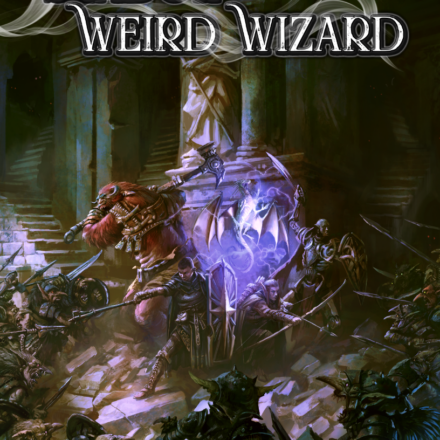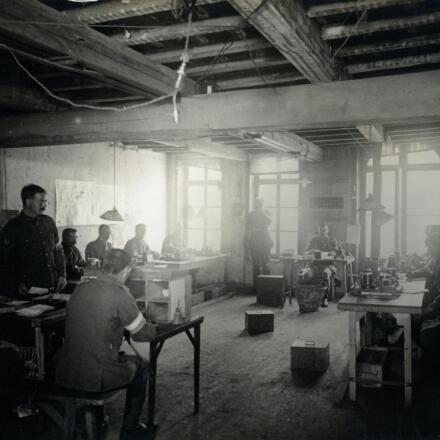Last night I did something that was very difficult as a Game Master; I ended a short campaign while the excitement was still high. There were some logistical reasons for this, but the main reason was that I’d pitched it as a mini-campaign and, in spite of a desire to continue, I stuck to my guns and ended it on a high note. Everyone involved knows we’ll be picking the game up in another month or two.
My inspiration for the ‘recurring series’ came from Dark Horse comics, who I remember (however accurately or inaccurately) making a point of putting out comic books of licensed properties as mini-series; rather than having one mini-series and/or an ongoing series, they would instead put out several mini-series of the same property. While this often meant that months would go by with no comics, each miniseries contained a strong story with no “filler issues.” You were always left wanting for more.
I generally take this approach with my campaigns. When I have a strong idea for a short campaign, I run it for my group; afterwards, we put the characters away until the next strong idea for that campaign world comes along. In between, we have breaks (missed sessions) or run other short campaigns.
There are a number of advantages to this approach:
Campaigns are tighter. I rarely feel the need to stretch material, as I know that when we’re done, the campaign is finished. If I’m not ready to start the next one, we just skip a week or two or let another GM run something for a few weeks.
I don’t need to write filler adventures. With a mini-campaign, every adventure counts; you’re less likely to waste sessions on side-quests or stretch out a scene just to fill an evening.
I get to strike when the iron is hot. I love GMing, and that often means that no sooner do I start something then something else catches my fancy. With a short campaign, I can ride out my current idea with the knowledge that I can spring my new campaign idea within a few weeks. On the flip side, I can make sure that I only return to a campaign world when I have strong ideas – I don’t need to ride a campaign into the ground.
I’m more likely to finish what I start. It’s a sad truth of my GMing and GMs I’ve played under that our long campaigns rarely finish properly. Most of them die such an early death that the mysteries were never solved or the ending was so pencil-whipped that it was unsatisfying. By running recurring mini-campaigns, I keep the campaign length manageable and, even if we don’t get back to that campaign world, there is a sense of completeness.
The session schedule is flexible. I’m 40 years old and my other regulars are about the same age. We have other commitments and issues that crop up all the time, forcing semi-regular absences. By running short campaigns, we can build in a lot of foreseeable breaks without losing momentum.
Players maintain a high level of interest. By running PCs through strong adventures and cutting the game after 6 weeks or thereabouts, the chance of “character fatigue” or loss of interest in the campaign is much less likely.Campaign themes also tend to be stronger. It’s easier for a player to remember the key points of three or four adventures; they don’t have to shake the cobwebs off to remember something that happened in January and how it affects the current adventure in June.
I can rotate in part-time players. Some players are only interested in certain RPGs or it’s not logistically feasible that they show up every week (rotating work schedule, long distance travel, etc). Short, rotating campaigns enables these players to commit to handfuls of sessions, rather than sit out altogether.
These are just some of the advantages I find when running a recurring series of short campaigns. How about you? Have you followed this model? What are some of the strengths and weaknesses you’ve uncovered? Is this something that you think would work with your group?

















This is an excellent method, thanks for sharing! My group has been meeting every week for more than a year and we’ve only just started our second campaign, mainly because our previous GM wanted to play for a change. Concentrating on shorter campaigns with stronger storyline sounds like an excellent way to allow other GMs to run something, whilst allowing the other ones to concentrate on something smaller, which would be far easier to plan. I’ll pitch it to them to think about this week.
I’ve done this in the past, with the only problem being tied to one of the big advantages. I have so many things that I want to run as a short format campaign, that old games rarely have a chance to make it back into rotation. I know, I know, woe is me, I have too many awesome games I want to play ;p
Ever since I read an article about structuring mini-campaigns like TV shows (or maybe it was a podcast) I’ve stuck to the concept of this kind of idea. Too many games and ideas to try out to be spending a year or more on a single campaign, I say.
When Scott Martin and I forged a group in 2007, this was pretty much the model that we based our planning around. A series of games going from 6-12 sessions to get from intro to finish.
Each series was followed by the GMs at the table being able to pitch their next game ideas and the group would select something new to play. A popular series could be revisited later on with a follow up adventure series, sort of like a TV sequel to a good mini series or movie.
It was working rather well for us until real life commitments decided to intervene….
Yes, I really liked the format. Many of our campaigns were longer (10 or so sessions), but a short, sharply defined series provides a lot of advantages.
A complement to the “rotating in part timers” point from the original post is that an offered game that isn’t perfect for you is less threatening–because it’s not going to last forever. You can experiment a little more, knowing that your bad stats won’t lead to a year of lagging behind your peers…
That’s quite true. Also, someone that dislikes a system beyond being able to play it can opt out of playing that series and then get to vote on the next series once the game they don’t like is done.
You also get to play a lot of different games. The chance to try new systems is there because a single campaign doesn’t go for years.
I, too, prefer this mini-campaign format, for all the reasons you’ve stated, plus one: it lets me play with many different people without making the group size unmanageable. 6-10 sessions with three players is my preferred set. After that, I change genres, players, and even play styles.
I was the most impressed with a mini-campaign with my ‘contemporary voodoo’ game. The four of us managed to schedule the sessions from beginning to end in advance, so even though conflicting timetables kept us from having more than three sessions with a full complement of players, I could arrange for there to be a reason for PC absences well in advance, with foreshadowing and all. Player absence turned into a plot device. A bit railroad-y, but worked out beautifully.
However, there is still a place in my gaming table for a particular type of open-ended game. I like to have a walk-in sort of game running, one where I have a sizeable pool of players to whom I can shout out an invitation on very short notice. To keep the sessions manageable, I ask them one at a time until I’ve got four or so players (I usually ask those who don’t get to game very often first). This system works quite well with mission-based campaigns.
My walk-in Cyberpunk game eventually hit a bit of a kink, though: as time went by and the PCs developed, they acquired distinct, and often diverging, interests; furthermore, at some point I discovered that a meta-plot had formed in the background, and I was sort of caught by it. This made it increasingly difficult to come up with plots that would hook in all the PCs while satisfying my urge to concoct a grand story. So I had to put an and to it: I declared that I’d be running one or two more sessions (a season finale, if you will) before putting the game on indefinite hold.
I’d be interested in hearing from anyone who’s had a similar arrangement, especially if they made it work for an extended period.
Yeah, I really like the concept of short campaigns, too, for all the reasons you listed.